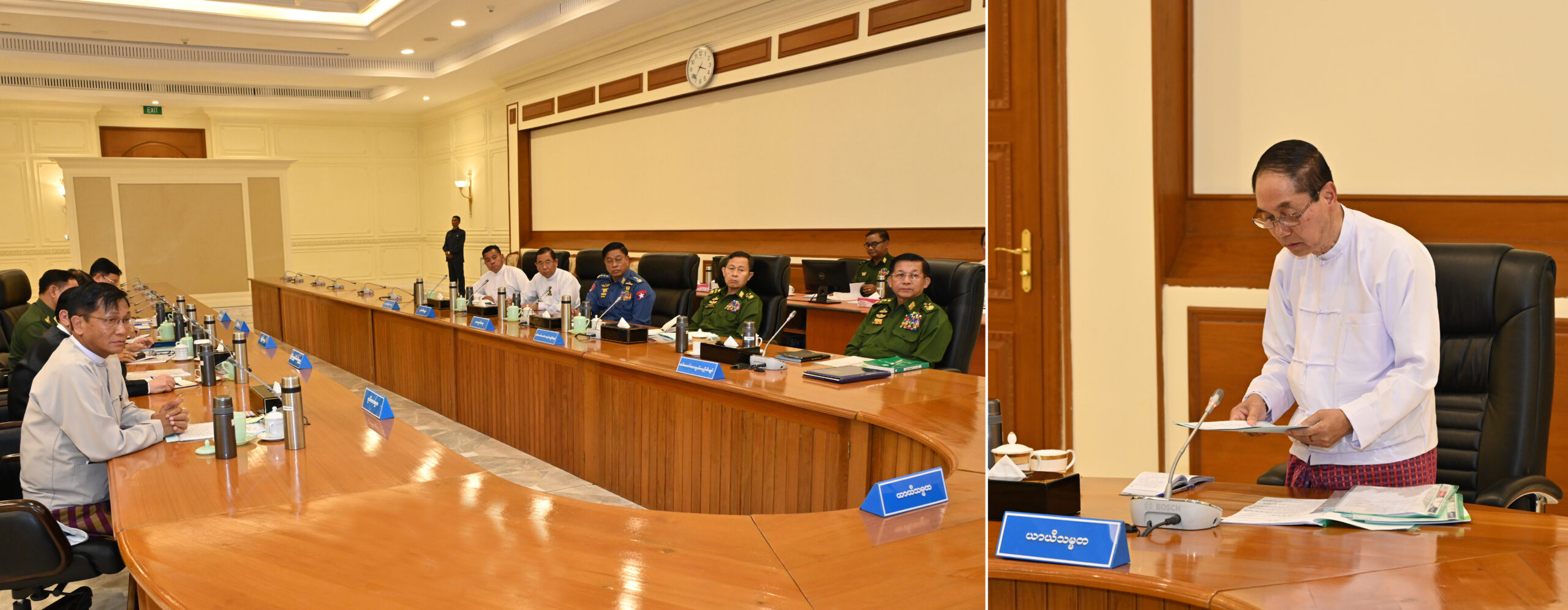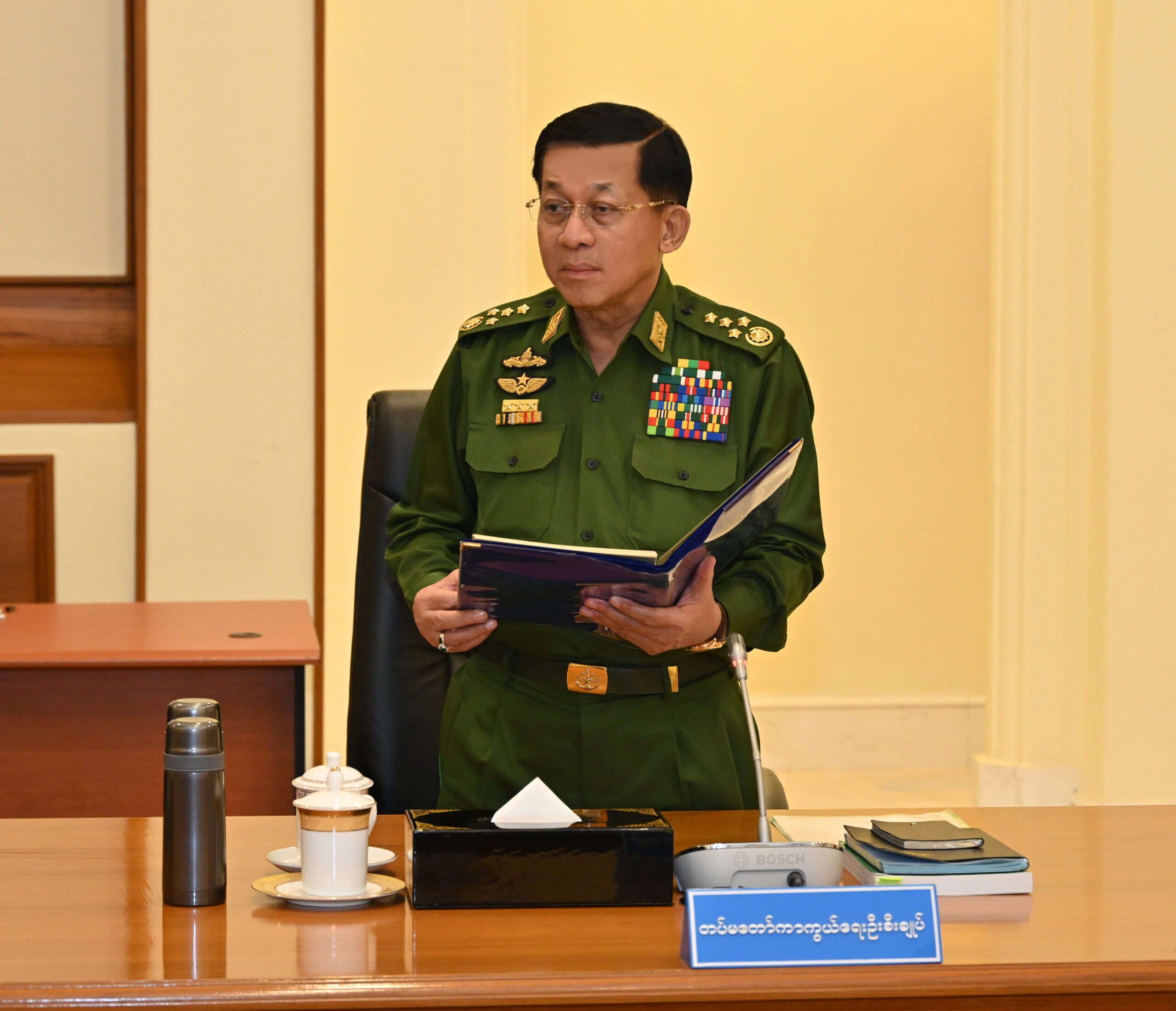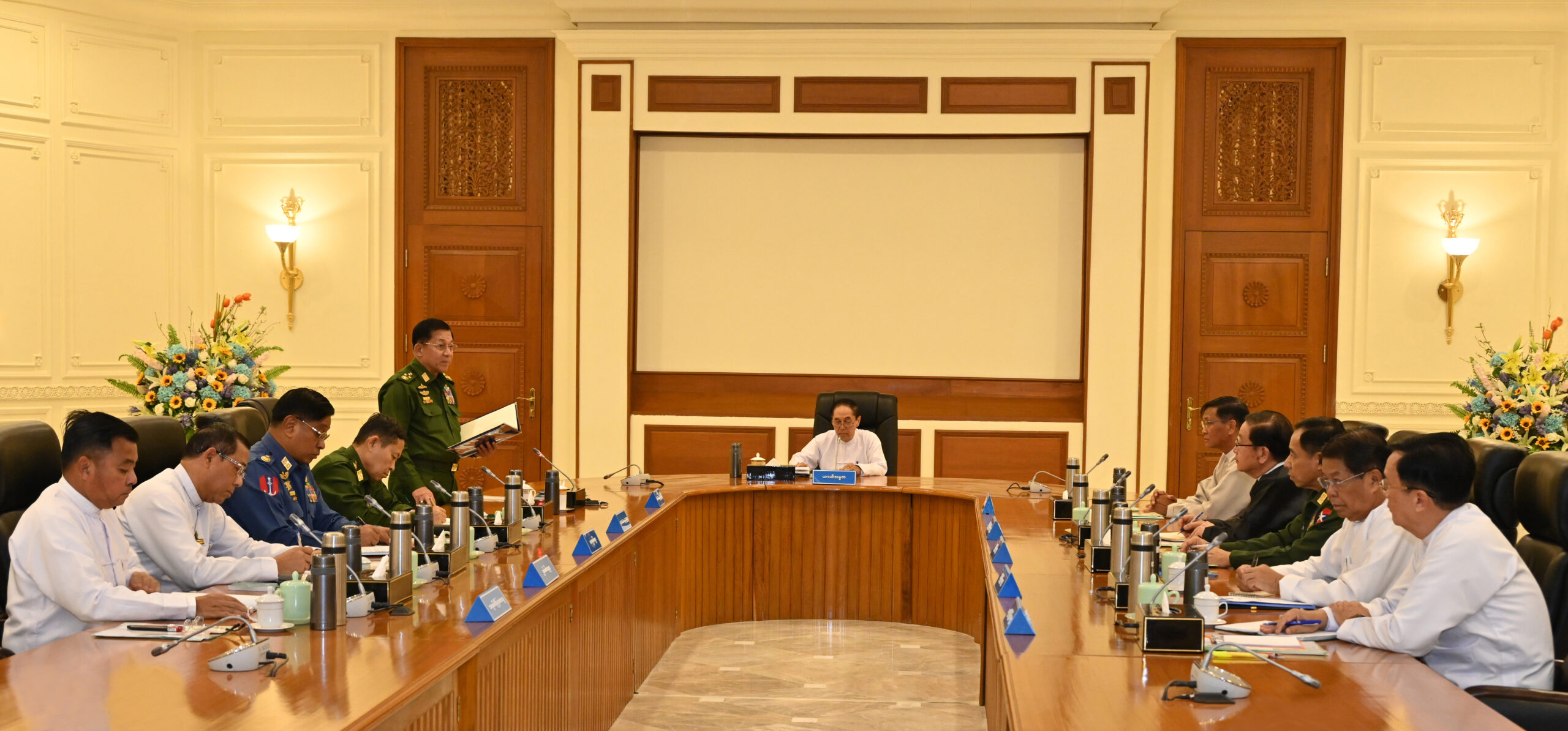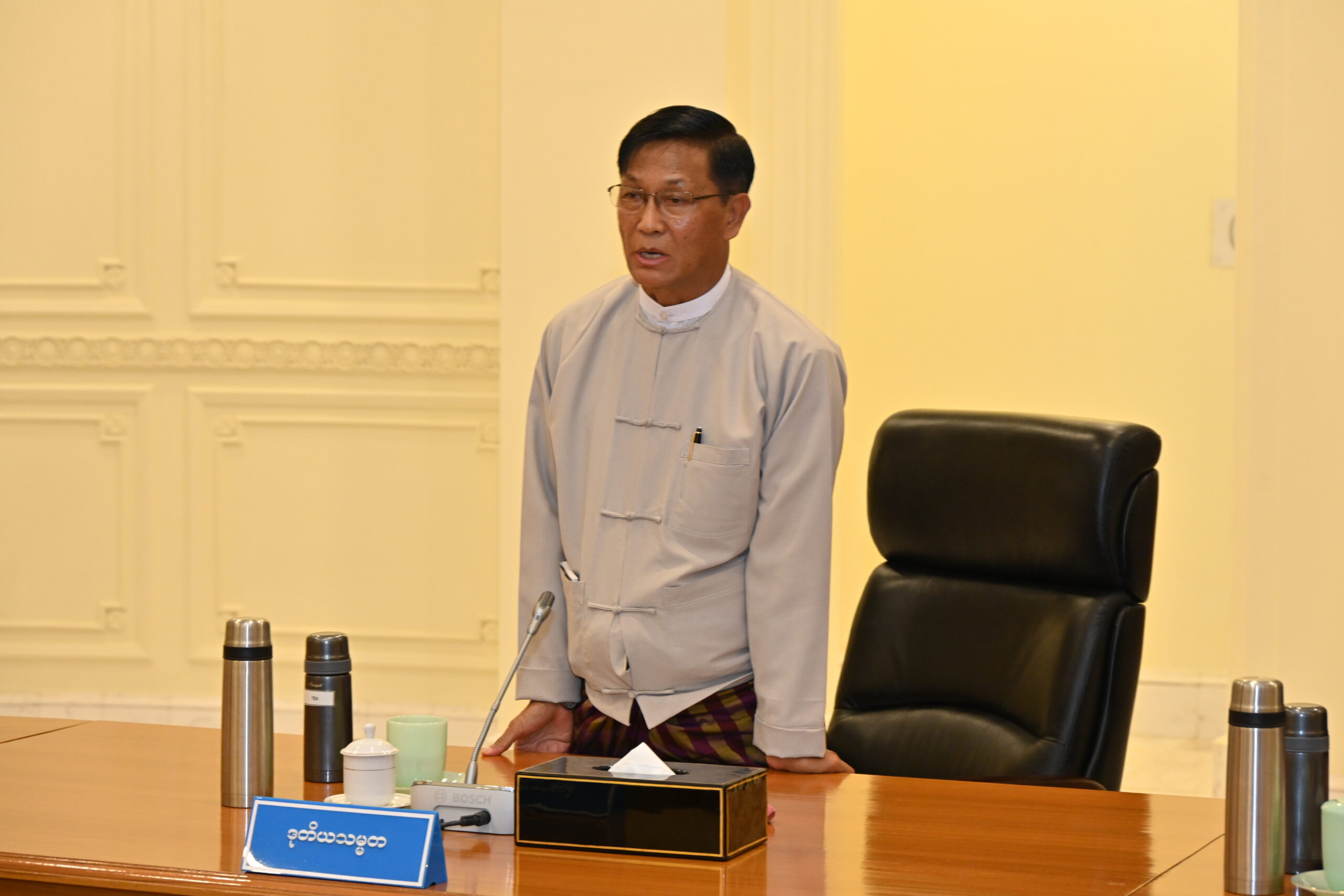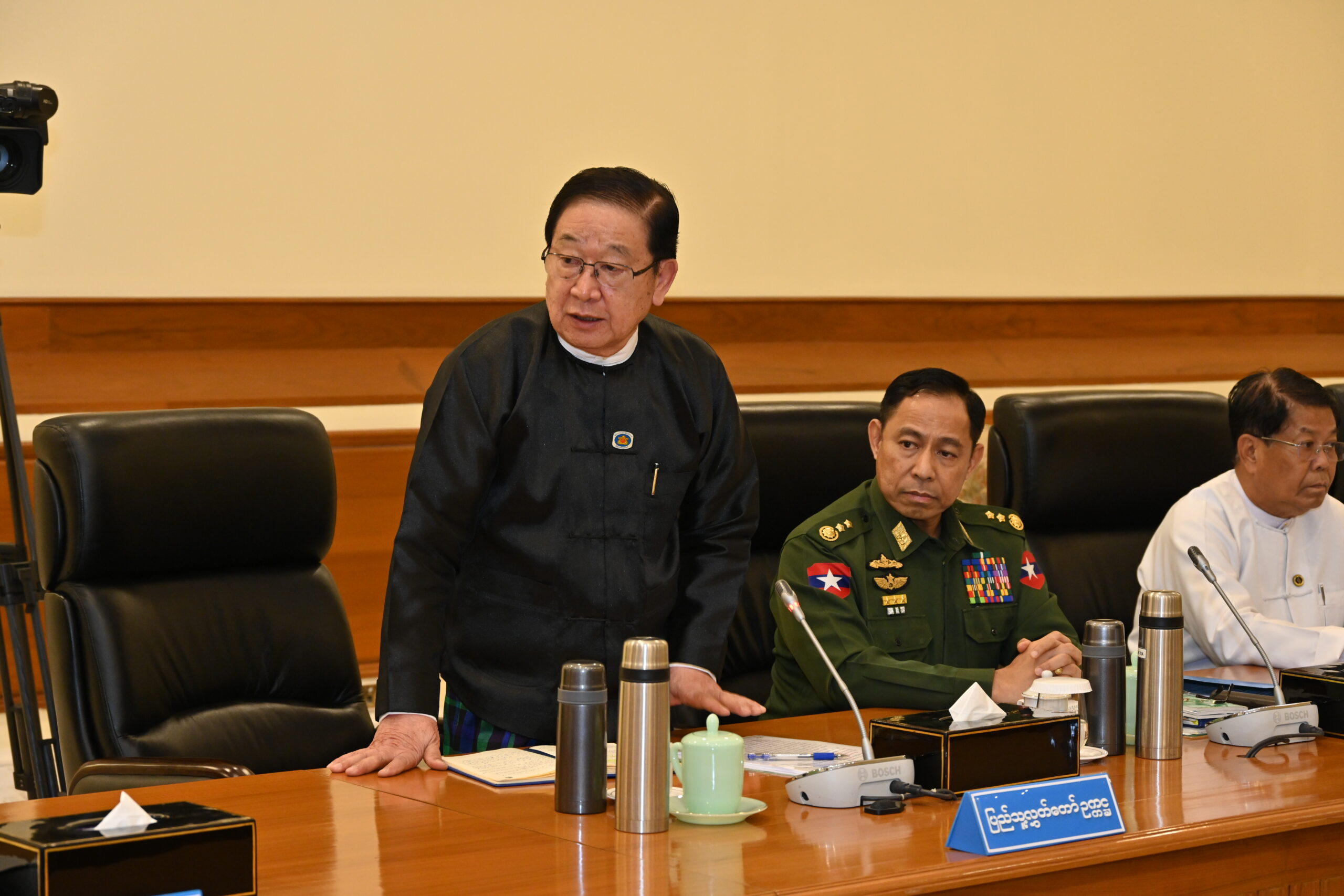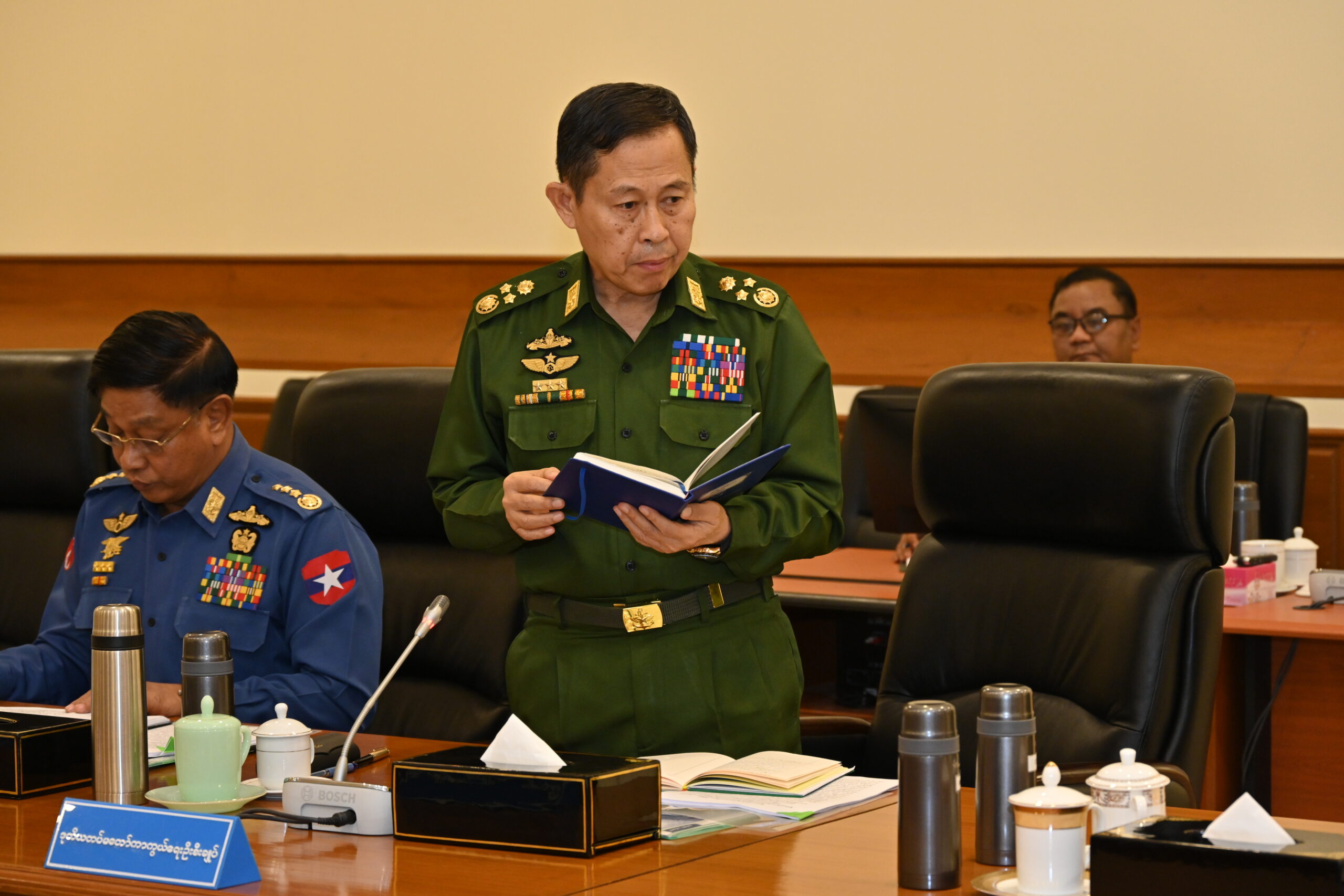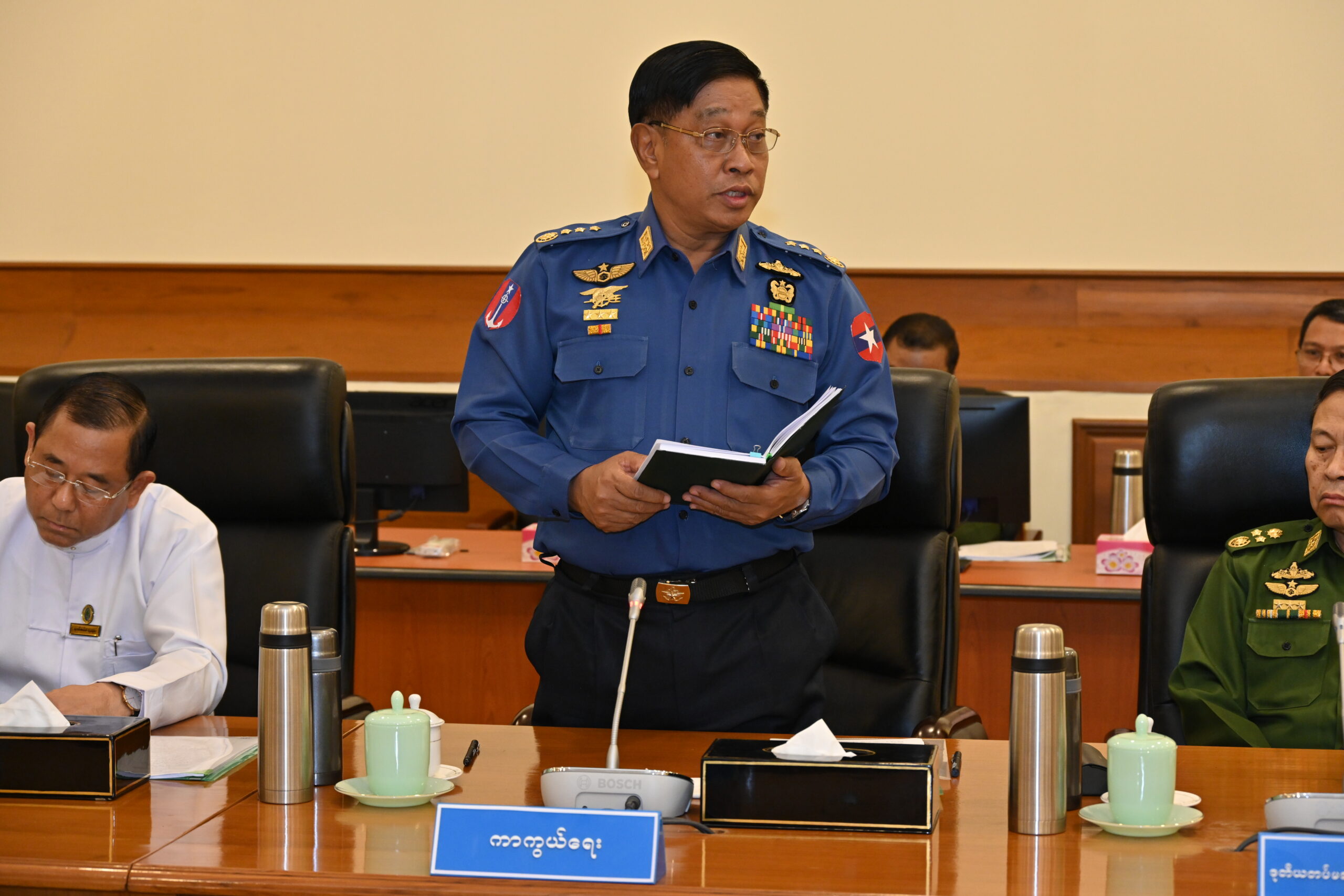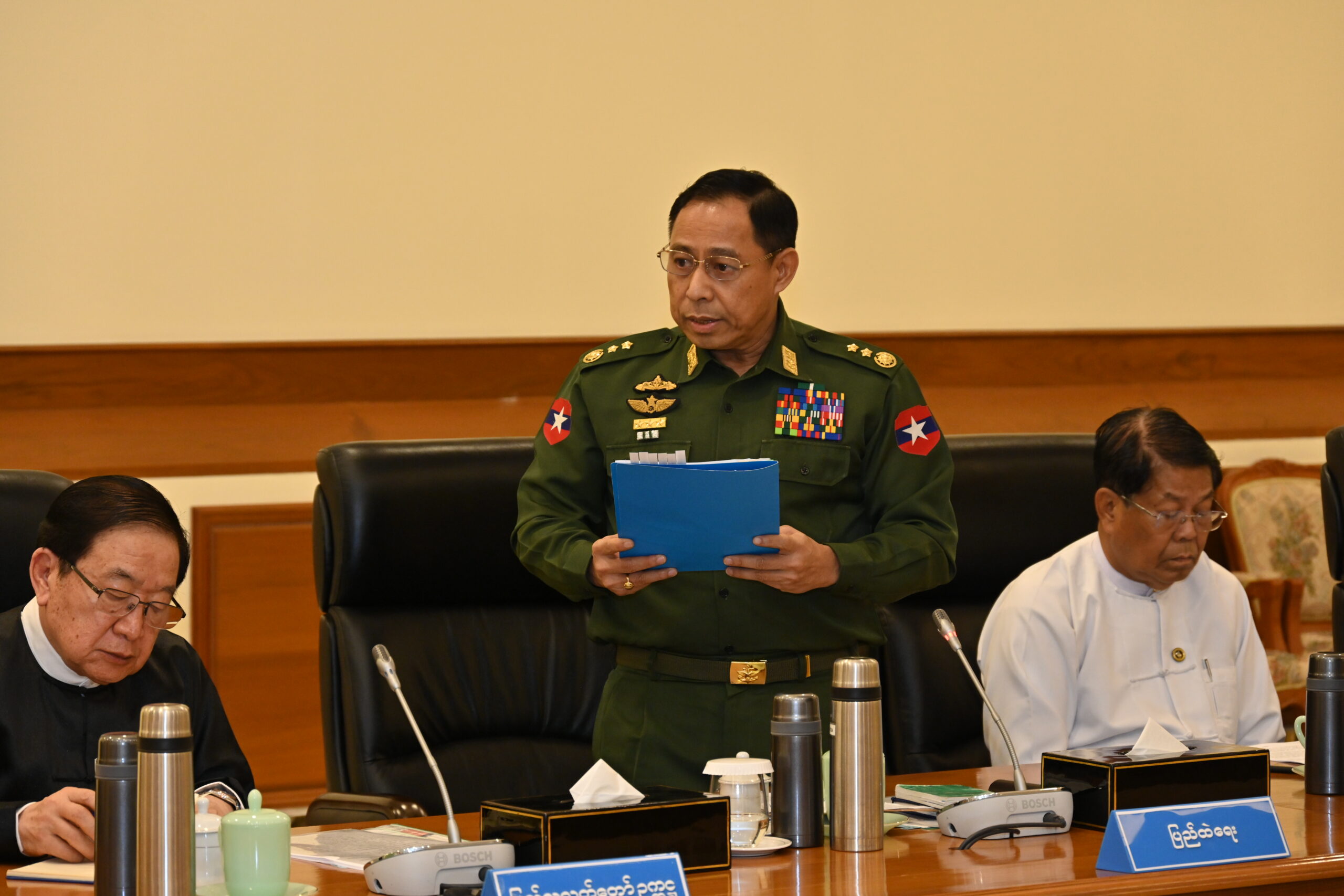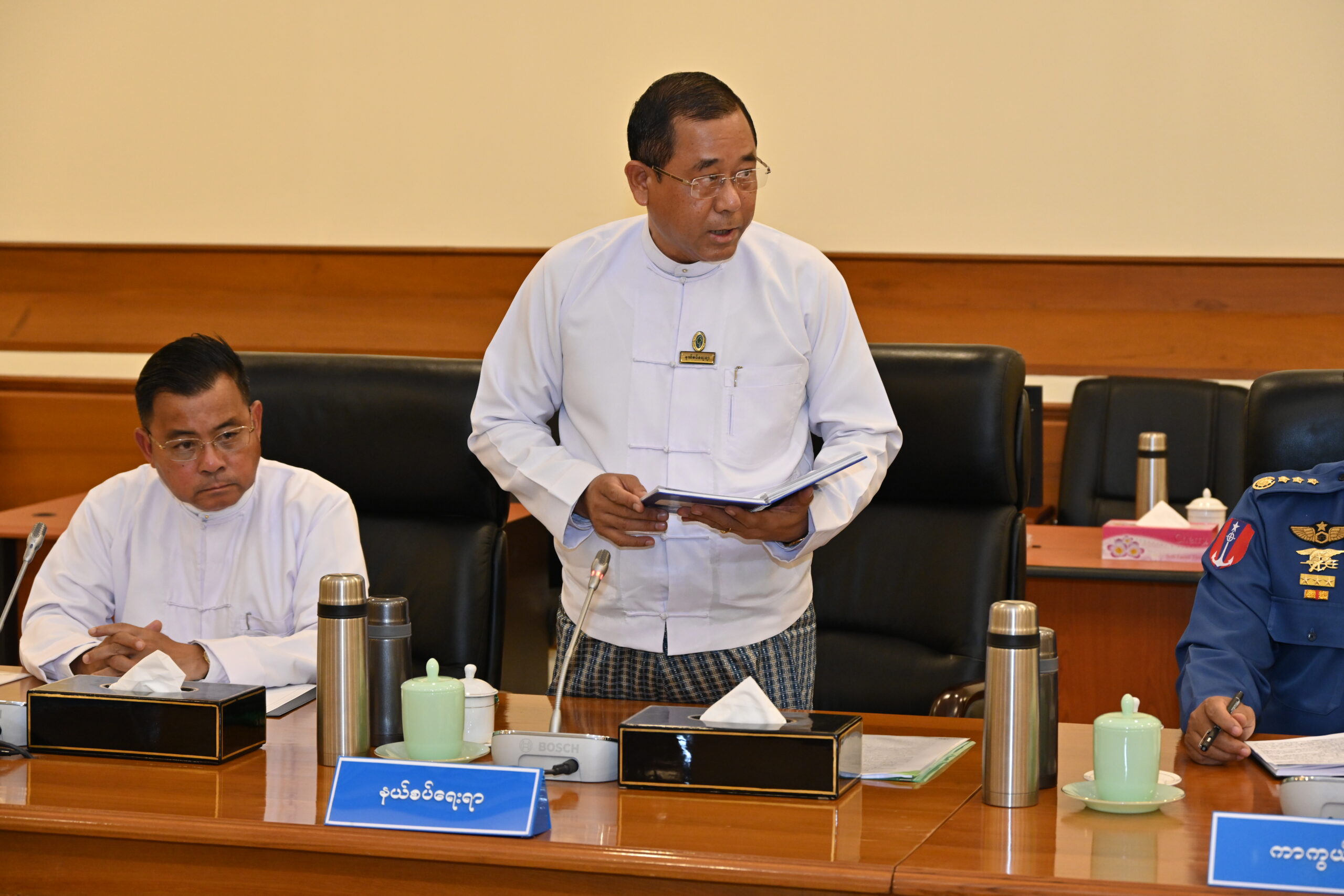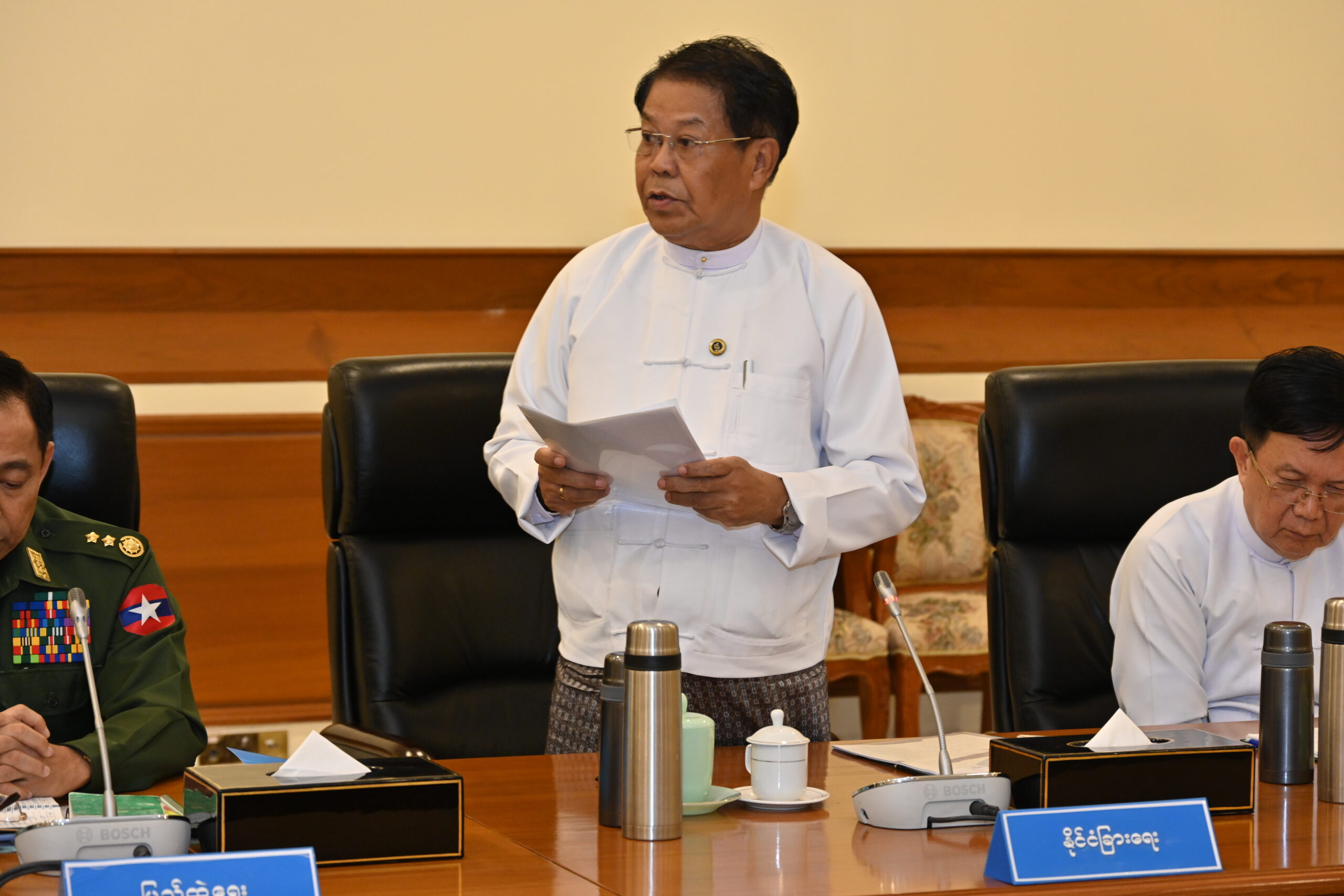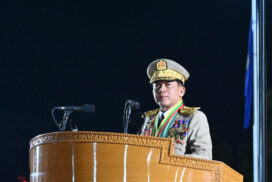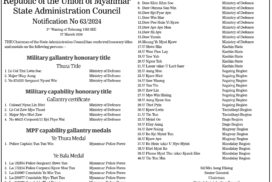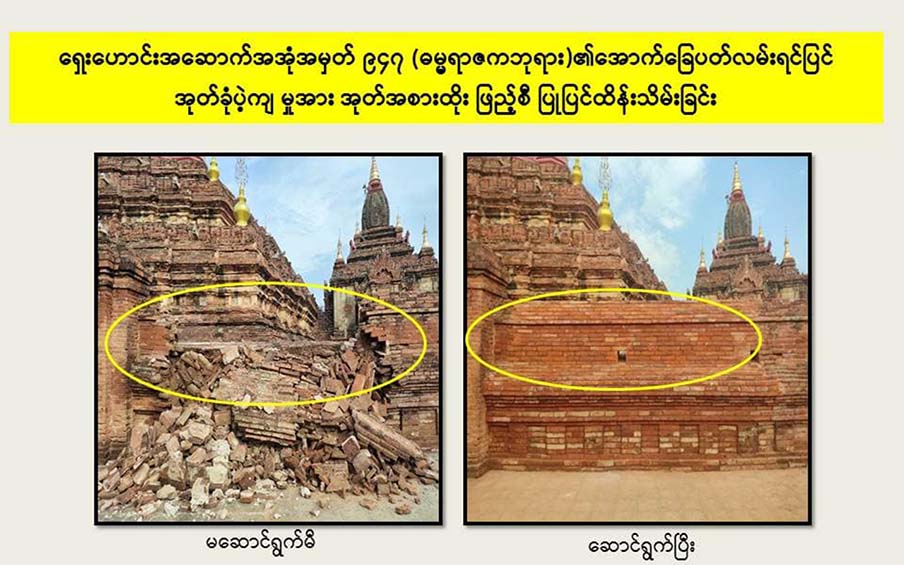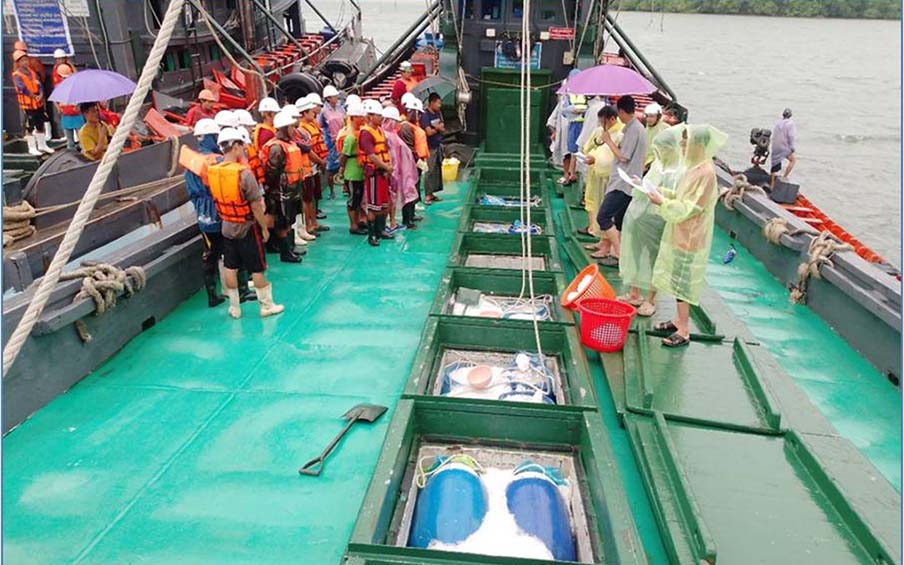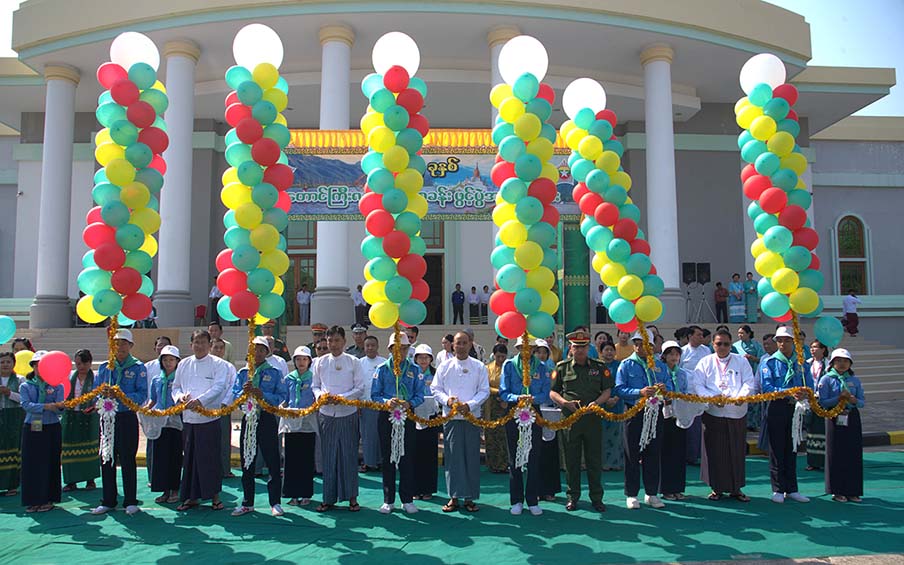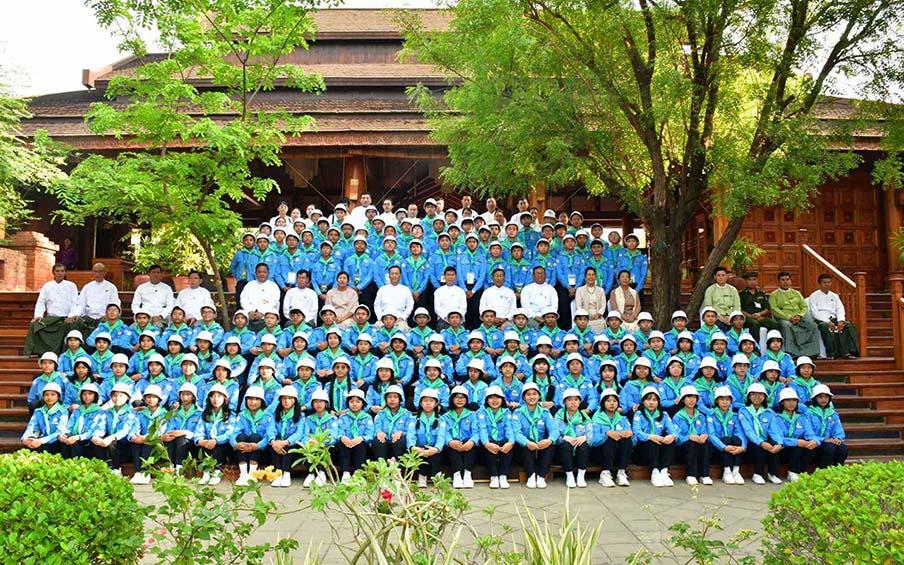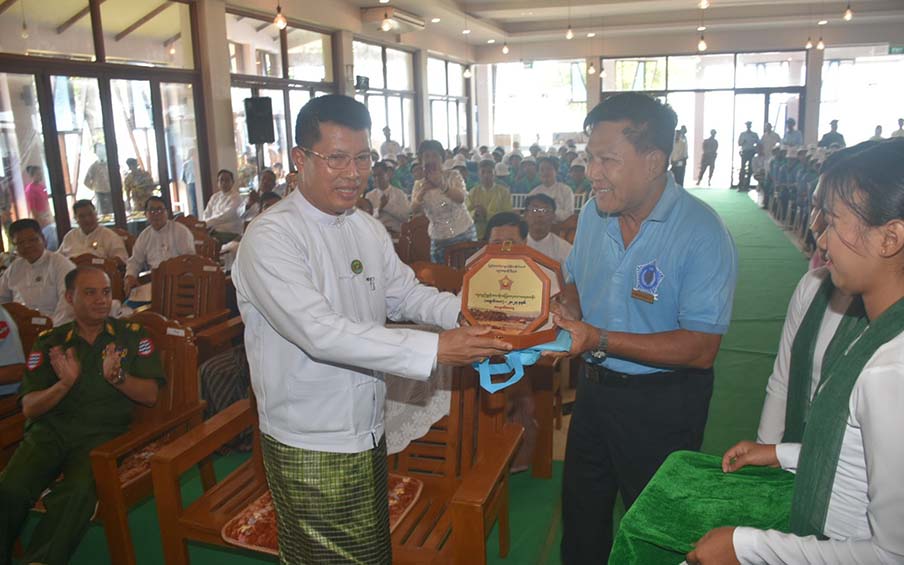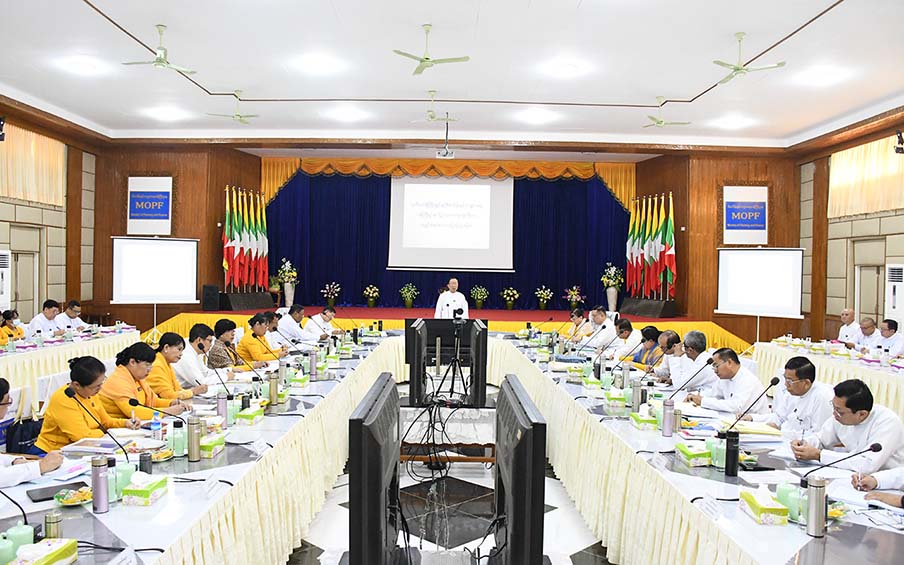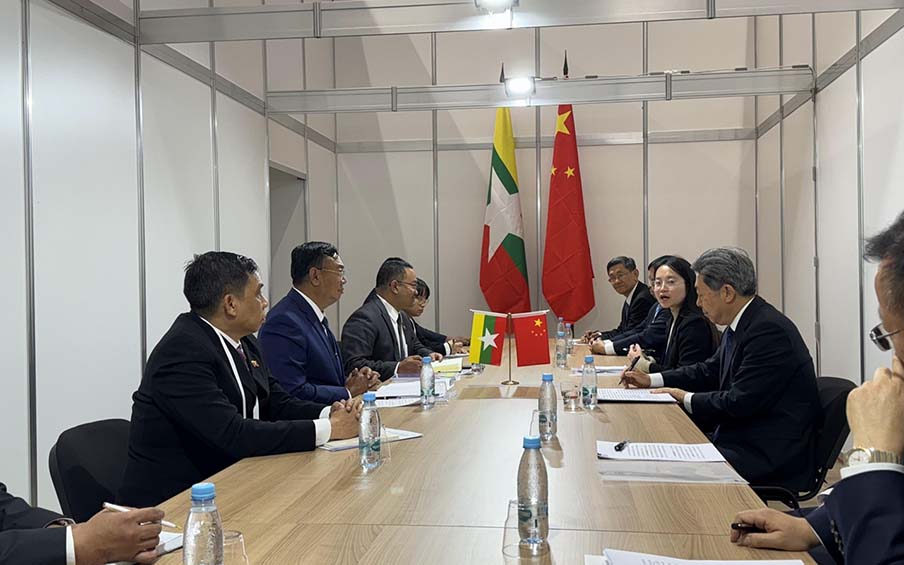The National Defence and Security Council of the Republic of the Union of Myanmar held meeting No 1/2024 at the office of the State Administration Council Chairman in Nay Pyi Taw yesterday.
Also, present at the meeting were Pro Tem President U Myint Swe, Vice-President U Henry Van Thio, Speaker of Pyithu Hluttaw U T Khun Myat, Commander-in-Chief of Defence Services Senior General Min Aung Hlaing, Deputy Commander-in-Chief of Defence Services Commander-in-Chief (Army) Vice-Senior General Soe Win, Union Minister for Defence Admiral Tin Aung San, Union Minister for Home Affairs Lt-Gen Yar Pyae, Union Minister for Foreign Affairs U Than Swe, Union Minister for Border Affairs Lt-Gen Tun Tun Naung, specially invited SAC Secretary Lt-Gen Aung Lin Dwe and Joint Secretary Lt-Gen Ye Win Oo.
Speaking on the occasion, the Senior General explained the undertakings in the six-month period of the State’s responsibilities and future tasks. With regard to the State security measures, he said that some EAO and PDF terrorists used various ways and means for the deterioration of the socioeconomic life of the people and peace and stability of the nation within six months. Regarding the incidents in Shan State (North), MNDAA insurgents launched attacks on Chinshwehaw with the use of drones starting on 27 October. To do so, MNDAA had made preparations by holding several meetings with its alliances since 2022. Alliances provided arms and ammunition, electronic technologies and monetary assistance. MNDAA primarily aimed to rebuild its power in the Kokang region as Special Region-1. At present, MNDAA robs the property of the people in the towns their occupied, destroys public property and recruits new members from families of local ethnicities. MNDAA follows the armed struggle line to grasp power without abiding by the law of Myanmar, which exercises a democratic system. The 2008 Constitution gurantees equal rights to all ethnicities in all regions and states in addition to self-administered zones. The Constitution designated the Kokang region in the eastern part of Thanlwin River as the Kokang Self-Administered Zone. Before the Constitution (2008), it was a special region. Kokang armed groups led by U Pheung Kya-Shin, which split from the Burma Communist Party, joined hands with Tatmadaw till 2009. Since then, the airbases of Tatmadaw were stationed to administer the region together. Although they were warned several times not to produce narcotic drugs in 2009, the group did not heed the warning. So, military action was taken against them. Kokang Self-Administered Zone was administered by elected persons in 2011. Then, Myanmar-China border trade was opened in Yanlonkeng of Laukkai, and Myanmar-China trade measures in Chinshwehaw were under both governments’ agreements until the period before the attacks. Tatmadaw will allow the desires of ethnic armed organizations under the Constitution, and some matters will be decided under the voting. Tatmadaw had disclosed that it agreed to amend some appropriate facts in the Constitution at the meetings with ethnic leaders and political leaders. According to country’s history and official relations process, all things will be done under the law in the Kokang Special Region. Tatmadaw representatives hold the meeting. If these facts are ignored, renewing the warlord system can be accepted for some background reasons.
MNDAA insurgents attacked Chinshwehaw and Kunlong, whereas its allied TNLA insurgents attacked Hsenwi on the Lashio-Muse route and disturbed Kutkai. TNLA insurgents attacked the Muse trade zone in 2016 and people’s militia camps and security outposts in Muse in 2018. So, clashes happened between Tatmadaw and TNLA. TNLA continued attacks on Namhkam, Namhsam, Mantung, Namtu and Mongngaw regions. It aims to grasp the Palaung region. The Constitution sets the Palaung Self-Administered Zone for the Palaung region. TNLA commits attacks to seize the greater power. They extremely rob and destroy the property of residents and recruit new troops, causing plight to residents. So, tea production in the Palaung region has declined. All basic education schools were closed. Up to now, the Palaung region has faced more economic and educational problems. If it accepts the multiparty democratic system, it has many opportunities to hold political dialogues. But TNLA turned a blind eye to such a point and used its arms to struggle. The insurgents buy drones from the neighbouring countries, and some drones can be prepared to be military used and equipped with large bombs. Insurgents interrupted main union highways to hamper the development of the socioeconomic life of the ethnic people and blocked the border trade route. Border trade is initiated under agreements of relevant countries. So, Myanmar is holding meetings with China to operate the regular process of border trade measures in the Muse region.
Tatmadaw takes all measures under the Rules of Engagement for Self-Defence and the Rules of Engagement for Counter-Terrorism and Counter-Insurgency Operations to restore normality and not to cause misunderstandings with other countries. So, Tatmadaw manages restricted operations for shells not to fall beyond the border line and not harm the people. Insurgents intentionally launch heavy weapons into other countries to cause misunderstanding. So, officials of both sides held talks to solve it. As insurgents attacked the military with technology and excessive strength, Tatmadaw retreated from some posts due to the possibility of harming the military families.
The complications in Shan State (North) were rooted in online scams. Kokang region has been using drug trafficking and gambling measures for many years. During the outbreak of Covid-19, online gambling was committed, and its supporting staff were brought there. Then, foreigners illegally arrived in the Laukkai region. At present, most illegal businesses are based on border regions of Myanmar, China and Thailand to commit online scams and online gambling on a broader scale. So, Myanmar, China, and Thailand effectively negotiate to combat such acts. Most of them are foreigners under the protection of ethnic armed organizations. As they can do illegal businesses relying on arms, it is necessary to cease the armed struggle. Severe action is being taken against those involved in the cases.
During the period from 5 October 2023 to 29 January 2024, a total of 48,210 Chinese and 1,810 other foreigners, totalling 50,020 who illegally reside in Myanmar, were handed over to relevant countries. On 23 January 2024, 1,002 male and 36 female Chinese, totalling 1,038 who fled from Pansang, Laukkai, Mongpauk and Mongla regions, were handed over to the relevant country under the law.
With regard to AA insurgents, AA insurgents violated the temporary ceasefire agreed with Tatmadaw in 2020 and participated in incidents in Shan State (North) in October 2023. Mainly, it wishes to take arms assistance from its alliances. From the time of the Tatmadaw government to date, development tasks have been undertaken in Rakhine State. So, Rakhine State can see unprecedented development at present. At a time when Rakhine State faced the impacts of storm Mocha, Tatmadaw and the government made utmost efforts for rehabilitation in Rakhine State. The Senior General himself arrived in Sittway and inspected the loss and damage in the natural disaster and took necessary measures. The SAC Vice-Chairman and senior military officers were sent to other townships to manage quick rehabilitation tasks. So, these regions regained improvements. Now, all storm-hit areas have greater progress. All universities and basic education schools were opened in Rakhine State 17 days after the storm, with the largest enrollment rate.
However, AA insurgents launched their attacks on the Donpaik police outpost of the border guard police force in Rakhine State at 5 am on 13 November 2023. Then, it used drones to attack two security posts in the Paletwa region and Pauktaw. At present, AA is attacking some regions of northern Rakhine State. Local Rakhine ethnics are suffering the impacts of the acts of AA insurgents, which commit instability in the region. Basic education school and university students are learning education for the 2023-24 academic year. At the start of 2023-24 AY, 573,000 students attended the basic education school in Rakhine State. Due to threats of AA insurgents, only 279,392 students are attending the schools, with more than 48,76 per cent of absentees suffering the impacts of AA insurgents. AA insurgents now recruit new student youth members and agitate hatred of other ethnicities. Only when Rakhine State restores durable peace can it hand over a good future life to new generations. So, the region will have greater progress. So Tatmadaw strives to ensure peace and stability and people in Rakhine State must cooperate with Tatmadaw.
NCF, which has signed the NCA, cooperates with CDF terrorists in committing terrorism in Chin State. On 29 October 2023, Tatmadaw re-occupied Thantlang, where CNF/CDF terrorists took positions. These terrorists attacked Reedkhorda in Falam Township and Lailinpi and Rezwa of Matupi Township in Chin State in November 2023. At present, CNF insurgents commit instability in Tiddim, Kanpetlet and Cindwe of Chin State.
KNPP/KNDF insurgents attacked Loikaw with excessive strength as of 11 November 2023. Due to information from residents, Tatmadaw assaulted a large number of KNPP/KNDF insurgents. These insurgents tried to accumulate arms and ammunition for attacks. On 17 December 2022, their arms and ammunition were seized in Sawta Village of Hopong Township. A total of 1,133 small arms and heavy weapons, 10 RPGs, more than 100,000 rounds of ammunition, more than 7,600 grenades, six 107-mm rockets and related accessories were seized in Panmont Village of Panglong on 16 November 2023 and Sanphu Village in Hopong Township on 20 January 2024. These arms and ammunition were taken from their allied ethnic armed organizations.
Seizing trafficking arms and ammunition to Kayah State could hinder the terrorism of KNPP/KNDF insurgents in Kayah State to some extent. At a time when the country is being built with democracy and federalism, unfaithful EAOs committing more conflicts and deterioration to the State are very dangerous for the country.
KNU insurgents, due to political changes in 2021, trained PDFs and disturbed small military posts in Myawady and Kawkareik. On 24 November 2023, KNU attacked a Tatmadaw camp with excessive strength. On 27 November 2023, the Chaunghnakhwa bridge in Kyaikmaraw Township was blown up. KNU insurgents and PDF terrorists attacked eight places in Kawkareik at 3 am on 1 December 2023, and Tatmadaw launched counterattacks on them. Based on different political attitudes, firm evidences showed that KNU commits regional terrorism by all means and online scams and gambling near Myawady of the Thai-Myanmar border. So, Myanmar will cooperate with neighbouring countries in combating these acts to forge the rule of law. KNU’s attacks harm the socioeconomic progress of local ethnic people in Kayin State, so Tatmadaw strives to ensure peace and stability in the region.
PDF terrorists committed terrorism across the nation within the six months from 1 August 2023 to 29 January 2024, killing three members of the Sangha, 438 innocent civilians and 79 State service personnel, totalling 520. They destroyed 11 electric/telecom towers, 97 bridges, roads and tollgate buildings, six health buildings, 13 schools and educational buildings, public houses and other buildings. PDF terrorists killed 77 members of the Sangha, two nuns, 5,677 innocent people and 1,124 State service personnel, totalling 6,880 from 1 February 2021 to 29 January 2024. They destroyed 559 telecom/electric towers, 53 health buildings, 670 schools and educational buildings, and public houses. They rudely threatened the education staff 413 times. At 5.50 pm on 13 November 2023, KNPP insurgents and PDF terrorists intentionally attacked Loikaw University and abducted educational staff and students.
Insurgents and terrorists taking advantage of instability in the country produce narcotic drugs and commit drug trafficking to earn income. Drug production contributes to money laundering, arms smuggling and terrorism, causing a challenge to the peace and stability of the State. As no chemicals and related accessories exist in the country, insurgents take these materials from other countries in various ways.
Concerning seizures of narcotic drugs, during the six months from 1 August 2023 to 29 January 2024, more than 1.1 tonnes of heroin, more than 117 million stimulant tablets, and more than 14.665 tonnes of Ice were seized in 3,272 cases worth K781.02 billion. In these cases, 4,373 males and females were arrested. During the period from 1 February 2021 to 29 January 2024, authorities seized 6.05 tonnes of heroin, more than 629 million stimulant tablets, more than 53 tonnes of Ice, and drug-related accessories in 21,098 cases worth more than K3,354 billion. A total of 29,486 males and females were arrested in these cases. According to the information related to the trafficking of AA insurgents, from 3 to 9 December 2023, more than two tonnes of Ice (methamphetamine) and 800 kilogrammes of restricted chemical Caffeine were seized together with a drug gang of AA insurgents.
Drug productions were based on the areas with poor transport facilities and the remote regions from administrative mechanisms in successive eras. Due to the Kuomintang invasion of Shan State and poppy cultivation and drug production by BCP and other insurgents, Shan State was notorious for being the largest opium producing area in the world.
UNODC mentioned in its annual report in 2023 that narcotic drugs from Shan State were smuggled to other countries via land borders and water courses. As UNODC and CCDCC of Myanmar cooperated in measuring poppy cultivation and production, production gradually declined from 2012. The annual report of UNODC in 2023 mentioned that 40,100 hectares of poppy were cultivated in Myanmar in 2022, compared with 30,200 hectares in 2021, increasing 33 per cent of poppy cultivation in 2022. So, China, Myanmar, Thailand, and other international organizations will effectively cooperate in the investigation, measuring and destruction of poppy and narcotic drugs.
Myanmar is eradicating narcotic drugs as a national duty. It cooperates with the United Nations, neighbouring countries, ASEAN countries, Mekong region countries, BIMSTEC countries and international drug control organizations in eradicating narcotic drugs. Only when all countries strive for the eradication of narcotic drugs in all aspects as a national duty will such a mission be achieved.
As terrorists attempt to deteriorate peace and stability in the nation, arrangements are being made to beef up the public defence and security system, including local people’s militia. Only when the country is peaceful and stable can it march towards the goal with a firm democratic system. So, the State Administration Council is implementing the adopted objectives and roadmap. So, not only security forces but all people have to prevent terrorism for the peace and stability of the nation. With regard to the public security system, relevant regions are implementing such a system and striving to take security measures in cooperation with people. And then, the public defence system will be implemented. It is necessary to give information about anti-government groups to the security troops. Those informants will be secretly kept. So, all ethnic people who are forging patriotic and national spirit must cooperate with the government in these measures. As these terrorists insult religions and lineage in addition to disturbing the peace and stability of the State, the State Administration Council will apply various ways and means to forge peace and stability in the State.
In the education sector, 8,108,227 students enrolled at basic education schools across the nation in the 2023-24 academic year. Now, 6,767,763 students are attending the schools, with 1,340,464 absentee students for various reasons, accounting for 16.53 per cent, mostly in some areas of Kayin, Chin, Kayah, Rakhine and Shan State (North). It shows the results of clashes with a lack of peace. A total of 112,968 students attended the universities in 2023-24 AY; now, 86,687 students are attending the universities, with 26,281 absentees, accounting for 23.3 per cent. Loikaw University sees no students at 100 per cent, whereas a large number of absentees can be seen at universities in Chin, Rakhine and Shan State (North). Acts of terrorists directly harm the learning of youths of new generations. As such, all people and international organizations need to oppose their acts.
As Myanmar exercises a multiparty democratic system, all should not be different from political, racial, and religious attitudes, and they all have to strive to reach the democratic system and Hluttaw’s path peacefully. On 15 October 2015, the government, the Hluttaw, Tatmadaw and ethnic armed organizations signed the NCA in the presence of international and local witnesses, including those from the United Nations. Pyidaungsu Hluttaw approved the NCA as a Union Accord. So, such a historical pact never annuals.
The 8th Anniversary of signing NCA was celebrated on 15 October 2023 with the attendance of stakeholders at home and abroad with essence.
The Senior General said he has been severally urged NCA signatory EAOs and non-signatory EAOs to demand their aspirations at the Hluttaw via peace talks not to derail from the democratic system if they require their aspiration by holding arms. Some groups from NCA signatory KNU and KIA, SSPP/SSA and KNPP, among other 11 non-signatory organizations, supported PDF terrorists to commit terrorism across the nation.
Since its establishment, SAC has been implementing two political visions: strengthening a genuine, disciplined multiparty democratic system and building a union based on democracy and federalism. To do so, all citizens have to participate in the implementation process. All must avoid the acts of derailing from the democratic system and abide by existing laws under the Constitution. It is necessary to choose the appropriate system related to the democratic system and federalism in building the Union based on democracy and federalism the entire people aspire to. No region or state is resided by a single ethnic in Myanmar. All ethnics are scattered in all regions and states. So, the political system is being implemented as a multiparty democratic system, and the administrative system will be based on the Union system rooted in democracy and federalism. The 2008 constitution allows Union level, region/state, and self-administered division and zones for the federal authorities.
Tatmadaw often agreed to amend necessary points of the Constitution (2008). Many provisions could be amended in previous terms of government, but some amended provisions have not been approved yet due to referendums.
Chapter XII of the Constitution mentions the provisions for amendment, so it is necessary to amend things under the Constitution through the Hluttaw process. So, the government needs to hold a multiparty democratic general election in line with the roadmap and amend some points inappropriate with the current eras through Hluttaw. NCA signatory EAOs have to contribute to the election to strengthen the nation’s democratic system.
Only when an election is free and fair will it show off the genuine aspiration of the people and implement the democratic system. As the NLD carried out undisciplined acts in the 2020 multiparty democratic general election, such an act cannot be removed from history. So, it is necessary to learn from past events not to cause similar occurrences and to strengthen a genuine, disciplined multiparty democratic system.
The Union Election Commission held meetings with political parties four times, and they agreed to exercise the Closed-List PR system instead of the First Past The Post-FPTP system in the elections. So, coordinations are being made to issue the election law and bylaws for relevant Hluttaws in conformity with the PR system. New political party registration law and bylaw were issued to ensure political parties were strong so as to take State responsibilities. So far, 50 parties have reapplied for registration as political parties under the law and bylaw, and 15 more parties have applied to establish new political parties, totalling 65. A total of 40 parties did not reapply for their registration under the law, and these have been automatically annulled under Section 25 of the Political Parties Registration Law. The UEC allowed registration for 47 of 65 political parties that submitted applications for re-registration and establishment of new ones. The registration of two political parties was cancelled. As such, a total of 45 parties are in operation.
The Senior General continued that the matters related to the political changes, widespread terrorist attacks launched by the PDF terrorists, efforts to promote the State economy and social sector and plans to hold elections were clarified while meeting the Chairpersons and Vice-chairs of the registered political parties on 6 January. They also reported their perspectives on the current political situation and difficulties. Moreover, the Law Amending the Political Parties Registration Law was issued. Section 429 of the Constitution (2008) states, “The National Defence and Security Council shall hold the general election in accord with the provisions of the Constitution within a duration of six months commencing from the day on which the ordinance is annulled under Section 426”. Therefore, the SAC will spare effort to hold the multiparty general election as per the No 5 of the Five-point Roadmap.
He noted that the ultimatum vision of the SAC is to hold a free and fair multiparty democratic general election. Therefore, the SAC will make concerted efforts to safeguard the rights of the public to cast votes and ensure a systematic general election despite the challenges.
The Hluttaw is the highest platform in political trends in democracy, and more ethnic representatives must join the political platform in the Hluttaw so as to demand the rights of their regions under the law. Selecting the designated representatives to attend the meeting is mandatory to make it a dignified Hluttaw meeting. Participation of parties from different regions and states in Hluttaw can represent the large community and give them a chance to speak out on matters that the people aspire to. About 28 per cent of the country’s population reside in the city, and approximately 72 per cent live in rural areas. The gap between some states and regions is more significant than that digit. Therefore, it should consider the rights of rural people to cast votes, not only focus on the wishes of people living in cities.
Moreover, preparations are being made for the election, emphasizing the regional tranquillity in Sagaing Region, Kayah, Chin, and Rakhine states, where there is a lack of peace and stability to a certain extent. Places with no peace cannot be left while elections are being held. An election must be held to have the Hluttaw sessions, and so if such places are gone, democracy will cease to exist in these regions, and there might be dictatorships and warlords that can affect the local ethnic people. Therefore, the political parties should participate in holding a free and fair election if they genuinely want a democratic system.
The voter lists should be carried out systematically in compiling them so as not to cause further stigma like the 2020 general election poll errors. Therefore, the enumeration of the 2024 census will be conducted. The pilot census was collected in 20 townships in October 2023 as a trial to prepare for data collection. Myanmar’s population was estimated at 56.2 million on 1 October 2023, based on the 2014 Myanmar population and housing census.
Meanwhile, the Union Election Commission conducted demonstrations of Myanmar Electronic Voting Machine at 42 organizations, including Central Level organizations, ministries, Nay Pyi Taw Council, Nay Pyi Taw Development Committee and universities, eight townships in Nay Pyi Taw and all the townships of Yangon Region, and the processes keep going in the townships of Mandalay Region.
The Senior General added that the SAC is serving the state’s duties to strengthen the democratic pathway of the country under the Constitution. Section 425 states the permit for two extensions of the prescribed duration for a term of six months for each extension typically. However, law enforcement has become weak, and the local ethnic people face losses in their socioeconomic sectors due to the armed conflicts in Shan State (North), some areas of Sagain Region, Chin and Kayah states. Moreover, the NUG and PDF terrorists launch attacks across the nation, taking advantage of such a situation, and so it needs to be carried out to attain peace through utmost efforts. That should be considered as an unusual or exceptional situation. The ethnic armed organizations also cooperate with online scam groups and launch attacks in border areas due to the lack of rule of law. Therefore, it also needs to ensure stability, security and the rule of law in border areas and combat online scams with the relevant countries. Therefore, the public security system will be upgraded to implement a public protection system with the public participation to carry out such operations effectively.
He also urged the council members and parties to make utmost efforts to be a nation with peace and stability, the rule of law, and the successful holding of multiparty democratic general elections.
The government took over the State’s responsibilities due to the voting fraud in the 2020 general election. It protected the genuine and disciplined multiparty democratic system that the people desired. Since serving the State duties, the government has focused on holding free and fair multiparty democratic general elections as per the roadmap to date. It can also be seen that the opposition groups are accelerating destructive actions daily to make the country unpeaceful and destroy the socioeconomic status of the public, neglecting the multiparty democracy that the people aspire. They also worry that their destructive plans to grab the State’s power unlawfully will be destroyed when the country returns to a peaceful and normal situation. Therefore, the government is making efforts to hold multiparty elections across the nation, will overcome the challenges and difficulties, and pledges to provide the essence of democracy for every citizen in accordance with stability, rules, and regulations.
He continued that Tatmadaw, Police Force and militia in the frontline are bravely preventing the destructive activities that undermine the state stability and security, so their actions are historic. They should be provided more. Similarly, the public participation in security measures is appreciated, and it will manage to cooperate systematically under the law.
He added that the required actions should be taken to ensure the normal situation in the country. Therefore, an extension of six months is necessary to carry out the duties for the unusual or exceptional situation under Section 425 of the Constitution.
Then, Vice-President U Henry Van Thio and Speaker of Pyithu Hluttaw U T Khun Myat agreed to the submission of the Commander-in-Chief of Defence Services to extend six months of the State of Emergency under Section 425 of the Constitution.
Deputy Commander-in-Chief of Defence Services Commander-in-Chief (Army) Vice-Senior General Soe Win also agreed to the submission of the Commander-in-Chief of Defence Services.
He then discussed two facts — security measures to promote the State stability and socioeconomic status of people, including nationwide peace and the rule of law, and compiling the census that is the primary requirement to receive correct voter lists to be able to hold a multiparty democratic general election, the ultimatum vision of SAC.
Union Minister for Defence Admiral Tin Aung San said that the SAC is accelerating the actions to strengthen the genuine and disciplined multiparty democratic system and building a Union based on democracy and federalism and a nationwide ceasefire.
However, some ethnic armed organizations committed destructive actions and attacks with the cover of NCA and insulted the perpetuation of the sovereignty of the country. Therefore, the six-month extension of the State of Emergency is agreed upon to implement the five-point roadmap of SAC and to hold free and fair multiparty democratic elections across the nation, upholding the Our Three Main National Causes.
Similarly, Union Minister for Home Affairs Lt-Gen Yar Pyae, Union Minister for Foreign Affairs U Than Swe and Union Minister for Border Affairs Lt-Gen Tun Tun Naung participated in the discussion and agreed to submit a six-month extension of the State of Emergency.
Then, the Senior General said the cases that occurred within six months are discussed, and the government is leading to a multiparty democracy pathway under the Constitution. Tatmadaw also agreed to amend some stipulations of the Constitution that should be amended. In certain areas where EAOs are in the situation, there is a lack of peace and law enforcement, and there are drug smugglings. Tatmadaw emphasizes State stability, whereas the abilities of Tatmadaw and police members are also improved.
Some of the political parties and ethnic groups made talks regarding public security. There are still requirements to implement a national military service system to serve public protection services where EAOs are in situations and in places lacking stability.
Moreover, the government works closely with all the countries, including the neighbouring countries. It also follows the foreign policies laid by the Constitution.
He continued that efforts should be made to get a typical situation before 1 February 2021. The protests and those launched armed attacks destroyed the expected situation. A free and fair election is needed to attain the normal situation. It also arranges to hold dignified elections and Hlutaw sessions. The number of elected Hluttaw MPs should be more than Tatmadaw representatives. Only then will it be a dignified election. The check and balance is also needed in Hluttaw. The council members should know these facts.
Then, the Pro Tem President said the six-month extension is needed under the Constitution based on the submissions of council members. He agreed to extend six months of the State of Emergency to carry out anti-terrorist activities and for unusual situations.
He then declared the extension of a further six-month State of Emergency in the entire nation, informed the National Defence and Security Council, and concluded the meeting 1/2024. — MNA/TTA/KTZH

